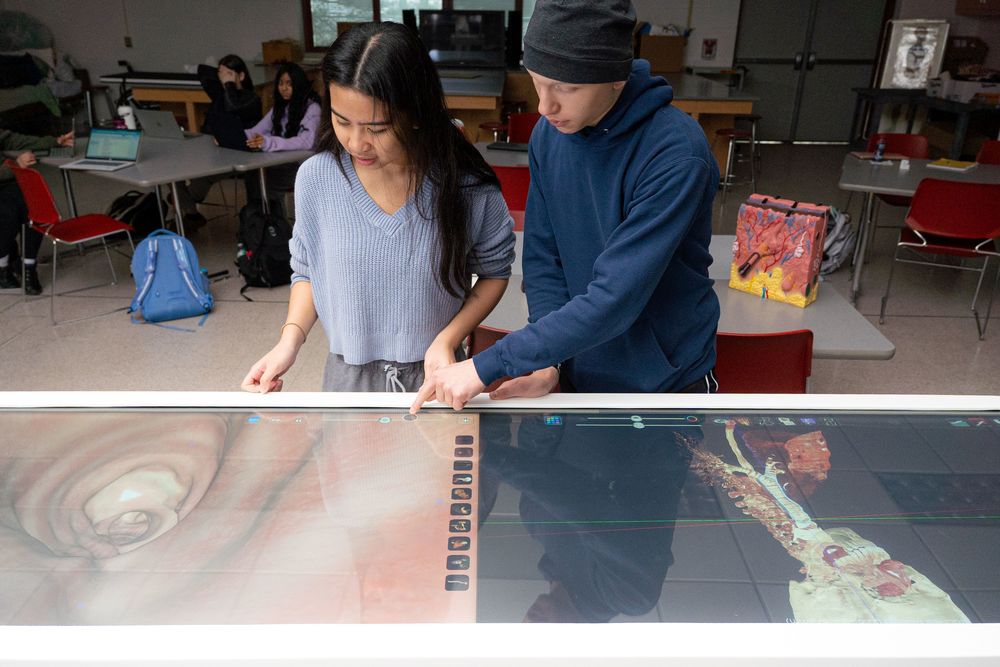Freehold, NJ — The Monmouth County Vocational School District has been awarded a $50,000 Elevate Career and Technical Education Innovation Grant from the New Jersey Department of Education. One of just six school districts selected statewide, MCVSD will use the grant to transform health sciences instruction at its Academy of Allied Health and Science in Neptune, with cutting-edge technology and interdisciplinary curriculum enhancements.
The Elevate CTE Innovation Grant is designed to help schools modernize and enhance programs of study in New Jersey’s key industry sectors. MCVSD applied for the grant to address the growing demand for health professionals with advanced skills in clinical reasoning, digital health informatics and data interpretation—areas increasingly critical in today’s healthcare environment.
“The CTE Elevate Grant is a fantastic opportunity to provide MCVSD students with industry-standard equipment that will allow them to gain the knowledge, skills and training needed to be successful in their educational and career endeavors,” said Dr. Jared Morris, CTE Director.
Modernizing Healthcare Education
MCVSD’s Academy of Allied Health and Science currently offers students strong foundational skills, and the $50,000 grant will be used to build authentic, data-rich clinical learning experiences across Clinical Skills, Dynamics of Healthcare, Nutrition and Anatomy & Physiology courses. Major investments include:
Digital diagnostic and biofeedback tools: heart-rate variability sensors, digital stethoscopes, digital blood pressure monitors, wearable pulse oximeters
Patient monitoring
: three Wellue 8" touchscreen patient monitors (with EtCO₂) on rolling stands
Anatomy and physiology technology: twelve Anatomage Tablets to support virtual dissection–style, case-based analysis, plus exploded skull anatomical models.
Clinical documentation and testing: ChartFlow Electronic Health Record (EHR) simulations and two EKG machines
Prototyping & visualization: two Bambu 3D printers and filament supplies for anatomical models
The initiative centers on three integrated priorities that mirror modern care settings:
Advancing clinical reasoning and patient assessment through wearable diagnostics, telemetry-style monitoring, EKG interpretation, and structured EHR documentation.
Enhancing anatomy and physiology with immersive technology by shifting to applied, systems-based casework using Anatomage Tablets and 3D-printed models to link structure, function, and patient data.
Strengthening health informatics and data literacy as students interpret vital-signs trends, telemetry outputs, and digital records—building the analytical habits needed for data-supported, AI-ready care.
In addition, new resources such as Anatomage virtual dissection tables, Electronic Heath Record (EHR) simulations, digital stethoscopes, electrocardiogram (EKG) machines, and 3D printers will give students hands-on exposure to the tools driving modern medicine.
“The Anatomage Table and Tablets will transform how our students learn, turning textbook concepts into interactive experiences. This technology will give them the clinical exposure and skills they need to thrive in college and beyond,” said Christina Merckx, Allied Health Instructor.
Preparing Students for High-Demand Careers
Students in Clinical Skills and Anatomy & Physiology I & II courses will benefit directly from the upgrades, shifting from memorization-based learning to applied, case-based exploration: reading EKGs and multi-parameter telemetry, documenting encounters in an EHR, and using virtual anatomy tools and 3D printed models to connect physiology to clinical findings. These experiences will strengthen technical communication, ethical reasoning with health data and patient-centered decision-making.
“We are super excited to be able to give our allied health students hands-on experience with the same digital health tools they are using in today’s hospitals," Harmon said. “This grant will also help us prepare them with the clinical reasoning and data skills needed to thrive in tomorrow’s healthcare careers.”
By the end of the grant cycle in June 2026, all students will complete a capstone project demonstrating mastery in at least two focus areas (e.g., telemetry interpretation, EHR documentation, anatomy-to-diagnosis casework). Rubrics will be co-developed with educators and industry partners, aligned with NCHSE and NJ standards, with advisory participation from local healthcare partners such as Jersey Shore University Medical Center.
“This investment supports MCVSD’s broader commitment to preparing students for success in New Jersey’s innovation economy,” said Dr. Charles R. Ford Jr., “By integrating advanced technology, promoting interdisciplinary learning, and embedding authentic clinical experiences, the district is ensuring graduates are not only ready for college but also equipped for high-skill, high-wage careers in medicine, nursing, public health, biotechnology, and health informatics.”
About Monmouth County Vocational School District
MCVSD operates six full-time Career Academies including the Academy of Allied Health and Science, Academy of Law and Public Safety, Biotechnology High School, Communications High School, High Technology High School and Marine Academy of Science and Technology. Each welcomes students as freshmen and retains those students through their senior year of high school, for a focused learning experience that helps them take meaningful steps toward their college and career goals.
MCVSD also operates more than 30 shared-time programs, a Career Center for students with special needs and adult programs. Questions about the admissions process for the MCVSD Career Academies or any other career and technical education program offered by MCVSD should be directed to applications@ctemc.org.

